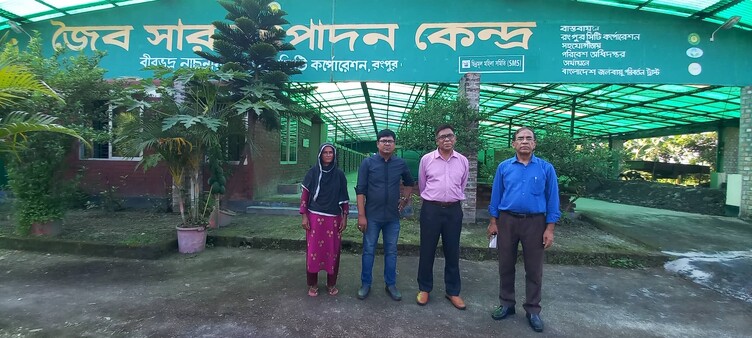- Markets, finance and governance
- Sanitation as a business and business models
- Why municipal waste treatment plants fail to operate: challenges and solutions..
Why municipal waste treatment plants fail to operate: challenges and solutions..
9873 views
- mahobul
-
 Topic Author
Topic Author- Skilled in leading and managing organizations, teams, and high-impact programs. Particular experience and passion lie in promoting the well-being of sanitation & waste workers, safeguarding both people and the planet through affordable solutions. With a strong background in waste management and livelihood initiatives, in all aspects of the process.
Why municipal waste treatment plants fail to operate: challenges and solutions..
Bangladesh is a developing country with a population of over 160 million people, which makes it one of the most densely populated countries in the world. With such a large population, the country generates a significant amount of waste, estimated to be around 10 million tons annually. To tackle this issue, the government and private sector have initiated various waste management strategies, including setting up municipal waste recycling plants. Over the past few decades, more than 50 such plants were demonstrated across the country. However, most of these treatment plants have become abundant due to technical know-how, marketing strategy, financial inclusion, and business model.
The waste recycling industry in Bangladesh started in the late 1990s when some private entrepreneurs set up small-scale recycling plants. These plants mainly focused on recycling paper, plastic, and metal waste. However, with the growing awareness of the adverse impact of waste on the environment, the government also initiated several recycling projects. The government focused mainly on managing solid waste in urban areas, where the waste generation is relatively high.
In recent years, Bangladesh has witnessed a rapid growth of municipal waste recycling plants across the country. These plants are not only helping in managing the waste but also creating job opportunities for the local people. The recycling plants mainly focus on collecting, sorting, and processing waste materials, which are then recycled into new products. Some of the common products that are recycled in these plants include organic waste, plastic bottles, paper, and metal. To make these municipal waste recycling plants successful, several factors need to be considered, including technical know-how, marketing strategy, financial inclusion, and business model.
The solutions:
The solutions to the challenges faced by the waste recycling plants in Bangladesh lies in addressing the factors that contribute to their success. This includes improving technical knowledge, developing effective marketing strategies, providing access to formal financial institutions, and creating a reliable supply chain for the waste materials.
Mahobul Islam, Boishakh 1430
#sdgs #waste #wastemanagement #recycle #recycling #3r #circulareconomy #urbanenvironment #pollution #pollutionsolution #mahobul #mahobulislam #iswm #swm #fsm #biogas #biogasplant #compost #organicfertilizer #wastebangladesh #bangladesh #plasticfree #plasticwastemanagement @ WASTE and Circular Economy Advisers
The waste recycling industry in Bangladesh started in the late 1990s when some private entrepreneurs set up small-scale recycling plants. These plants mainly focused on recycling paper, plastic, and metal waste. However, with the growing awareness of the adverse impact of waste on the environment, the government also initiated several recycling projects. The government focused mainly on managing solid waste in urban areas, where the waste generation is relatively high.
In recent years, Bangladesh has witnessed a rapid growth of municipal waste recycling plants across the country. These plants are not only helping in managing the waste but also creating job opportunities for the local people. The recycling plants mainly focus on collecting, sorting, and processing waste materials, which are then recycled into new products. Some of the common products that are recycled in these plants include organic waste, plastic bottles, paper, and metal. To make these municipal waste recycling plants successful, several factors need to be considered, including technical know-how, marketing strategy, financial inclusion, and business model.
- The primary challenge in running a recycling plant is the technical know-how. The recycling process requires specific technical knowledge, which most of the plant owners lack. As a result, they fail to process the waste materials efficiently, leading to poor quality products and low profits.
- Another crucial factor in running a successful recycling plant is a robust marketing strategy. The recycled products must be marketed effectively to create demand and generate revenue. The government has also initiated various programs to promote the use of recycled products, which has created a significant demand for these products in the market.
- Financial inclusion is another critical factor that has contributed to the success of the municipal waste recycling plants in Bangladesh. Most of the plant owners are small-scale entrepreneurs who do not have access to formal financial institutions. As a result, they depend on informal lenders who charge high-interest rates, leading to a significant financial burden.
- Lastly, the business model of the recycling plants is also crucial for their success. The recycling industry requires a steady supply of waste materials to operate, but most of these plants face supply chain issues. They depend on informal waste pickers for the waste materials, who are not reliable and often sell the waste to other buyers.
The solutions:
The solutions to the challenges faced by the waste recycling plants in Bangladesh lies in addressing the factors that contribute to their success. This includes improving technical knowledge, developing effective marketing strategies, providing access to formal financial institutions, and creating a reliable supply chain for the waste materials.
- To improve technical knowledge, the government and private sector can initiate more training programs and workshops for the plant owners and workers. This will help them to better understand the recycling process and operate the plants more efficiently.
- Developing effective marketing strategies for the recycled products is also crucial to increase their demand in the market. The government and private sector can collaborate to promote the use of recycled products and create awareness among consumers.
- Providing access to formal financial institutions will help small-scale entrepreneurs in the recycling industry to access capital at lower interest rates, which will reduce their financial burden and help them to grow their businesses.
- Creating a reliable supply chain for the waste materials is also critical for the success of the recycling plants. The government and private sector can work together to establish a system for collecting and transporting waste materials to the recycling plants. This will ensure a steady supply of waste materials for the plants, leading to increased efficiency and profitability.
Mahobul Islam, Boishakh 1430
#sdgs #waste #wastemanagement #recycle #recycling #3r #circulareconomy #urbanenvironment #pollution #pollutionsolution #mahobul #mahobulislam #iswm #swm #fsm #biogas #biogasplant #compost #organicfertilizer #wastebangladesh #bangladesh #plasticfree #plasticwastemanagement @ WASTE and Circular Economy Advisers
Mahobul Islam
Chair, FSM & CE Working Group, FINISH Mondial Programme
Founder and CEO, Waste and Circular Economy Advisers, Bangladesh; www.wastebd.org
20 years of experiences in sanitation & waste management, bio energy infrastructures, financial inclusion & municipal governance in Bangladesh and overseas (Nepal, Sri Lanka, India, Kenya, Tanzania, Uganda, Ethiopia).
Specialized knowledge on Inclusive & Sustainable Waste Management (ISWM) planning for developing countries, and institutional capacity development on service model for municipal waste management, MSMEs in waste value chain.
Chair, FSM & CE Working Group, FINISH Mondial Programme
Founder and CEO, Waste and Circular Economy Advisers, Bangladesh; www.wastebd.org
20 years of experiences in sanitation & waste management, bio energy infrastructures, financial inclusion & municipal governance in Bangladesh and overseas (Nepal, Sri Lanka, India, Kenya, Tanzania, Uganda, Ethiopia).
Specialized knowledge on Inclusive & Sustainable Waste Management (ISWM) planning for developing countries, and institutional capacity development on service model for municipal waste management, MSMEs in waste value chain.
Attachments:
-
 1681563328005.jpg
(Filesize: 95KB)
1681563328005.jpg
(Filesize: 95KB)
The following user(s) like this post: paresh, ProdriguezAT
Please Log in to join the conversation.
You need to login to reply
Share this thread:
- Markets, finance and governance
- Sanitation as a business and business models
- Why municipal waste treatment plants fail to operate: challenges and solutions..
Recently active users. Who else has been active?
Time to create page: 0.136 seconds







